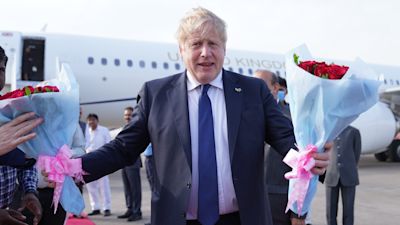Insight
Boris Johnson says he will fight next election as Tory leader despite mounting partygate rebellion

Boris Johnson has insisted that he will fight the next general election as Conservative leader and said he could not see a circumstance in which he would resign. “I don’t propose to go,” he said, when asked if more partygate fines could change his position. Asked whether his answer meant he felt the scandal of rule-breaking in Downing Street didn’t matter, he said: “You’re better off talking about things other than politicians themselves.”
Speaking to journalists on board a plane to India for a trade visit, he also batted away suggestions that he should put himself up for a confidence vote by Conservative MPs to face down his critics. “The best thing to do for the people, for Parliament, is to get on and focus on the things we were elected to do,” he said. It came as the government moved to delay tomorrow’s controversial vote on whether to refer the PM to a parliamentary committee over his decision to deny the initial allegations around partygate. Headed to India for a trip in which he hopes to deepen ties between the countries and make progress towards a free trade deal, Johnson batted away questions on partygate.
He did speak about the situation in Ukraine, saying he was deeply skeptical about any hopes for peace talks between Ukraine and Russia.
“How can you negotiate with a crocodile when it has got your leg in its jaws? That is the difficulty the Ukrainians face.” He said it was up to Ukrainians to decide on their future but said: "I think it’s very hard to see how the Ukrainians can negotiate with Putin now given his manifest lack of good faith and his strategy, which is to try to engulf as much of Ukraine as he can and then perhaps to have some sort of negotiation from a position of strength.”
He said that president Zelenskyy’s view was that he would like Russian forces expelled from existing positions in Donetsk and Lushansk – describing it as a “pretty maximalist position”. But argued that on Crimea he was “not as maximalist”.
Asked what his message would be to Modi on Ukraine – after India failed to condemn Russia’s invasion as others have - the prime minister suggested he wouldn’t take an overly tough line: “The UK has to recognise that there is an historic relationship that India has with Russia.
"I think we have to be alive to that – and just point out where Putin is – I’m afraid letting Russia down so badly.”
On the question of oil, he also refused to criticise India after it ramped up its purchases of Russian oil, but said he would keep arguing for countries to cut their reliance on “Putin’s hydrocarbons”. Mr Johnson also claimed that he was aiming for a free trade agreement with India by the end of the year.
However, sources close to trade negotiations told ITV News that such a fast timetable was unlikely for a comprehensive agreement, although they believed an interim agreement may be possible. The UK is hoping that India will cut its huge 150% tariffs and duties on Scotch whisky, and its 125% tariffs on cars, while India wants more liberal visas for students and specialists to come to the UK, and reduced tariffs on agricultural goods. Johnson hinted at being prepared to do more on immigration for India, arguing that there was a “massive shortage” in the UK of some expertise – including in IT and programming. “We are short to the tune of hundreds of thousands in our economy – we need to have a professional approach – but it has to be controlled.” On day one of the India trip – Mr Johnson will announce £1 billion of commercial deals that will create 11,000 new jobs.
For analysis on news' biggest stories, listen to the ITV News What You Need To Know podcast